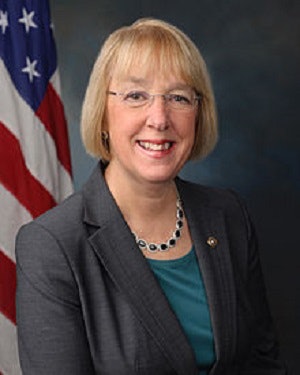Democrats in Congress are trying to limit the impact of the coronavirus on students, as K-12 schools and higher education institutions close or move online because of the coronavirus pandemic.
On Friday, Sen. Patty Murray, introduced the Supporting Students in Response to Coronavirus Act alongside Minority Leader Chuck Schumer and Sen. Kirsten Gillibrand. Rep. Bobby Scott, chair of the House Committee on Education and Labor, introduced a sister bill in the House of Representatives.
 U.S. Sen. Patty Murray
U.S. Sen. Patty MurrayAlongside other measures, the $3 billion legislation would give $1.2 billion in emergency financial aid to offset the costs of sudden campus shutdowns, including food, housing, health care and child care. It also sets aside another $1.2 billion in Education Preparedness and Support Grants to governors to handle the manifold effects of school closures.
“Across the country, schools are preparing for temporary closures, students are wondering how they’ll receive vital services, educational facilities need to be cleaned, college students need help finding food and housing, and early education programs need help remaining open and staffed,” Murray said in a statement. “That’s why I’ve introduced a bill to ensure that our coronavirus response provides the resources our students, teachers, other staff, and schools so desperately need.”
Dr. Julie Ajinkya, vice president of applied research at the Institute for Higher Education Policy praised the proposed legislation for highlighting “the importance higher education plays in students’ daily lives … beyond just what goes on in the classroom and what can perhaps more easily be delivered through virtual technology.”
Low-income students – who might be food-insecure or rely on campus housing – could be stripped of basic needs their campuses usually provide as colleges shift to online courses for indeterminate periods of time. For these students, campus shutdowns come with added financial stress, which could exacerbate equity gaps in completion rates, Ajinkya added.
“We as a society need to think about what we want to look like on the other side of this,” she said. “When we are able to look past this pandemic, we want to make sure our students haven’t been abandoned by higher education.”
Notably, the bill would also give students temporary waivers so they don’t have to pay back Pell Grants or repay student loans if they stop school during the disrupted term. Plus, the bill relaxes rules around financial aid that depends on students achieving certain markers of academic progress, given the current tumult as students shift their studies online.
Federal financial aid is usually governed by “a lot of very tight rules and regulations,” said Megan Coval, vice president of policy and federal relations at the National Association of Student Financial Aid Administrators. So, measures like this aim to give schools “maximum flexibility” so they can continue to offer students the aid they need. The Department of Education has been a part of that effort as well, she noted, waiving interest on federal student loans as of Friday.
This flexibility is important at a time rife with what-if scenarios for financial aid recipients: What if students rely on work-study jobs to pay the rent but they can’t go to campus? What if Pell Grant recipients drop out during the last semester of their eligibility because of coronavirus-related emergencies? Does the interrupted semester count?
“I think what the [Department of Education] has been able to do and what Congress is signaling it’s interested in doing is saying, ‘In this time, in this dire circumstance, we don’t want students to be penalized,’” Coval said.
Still, the work of figuring out how to keep students from financial harm during the pandemic has just begun as new considerations continue to arise.
For example, graduates paying back student loans may be hard hit by the extra costs of coronavirus, especially if they work hourly and are forced to work less. Coval hopes measures will be put in place to allow them flexibility in their repayments as well. She expects to see more bills from Congress on how to bolster higher education institutions, their students and their alumni amid the global crisis.
“Because we have so many institutions of higher education and they’re all so different and they all serve different students and there are so many unique student circumstances, this is probably something we’re going to have to chip away at in order to really make sure we help the students the most,” she said. “But I think this piece of legislation was a great first step … We’re just learning what all the different needs are.”
Sara Weissman can be reached at [email protected].





















